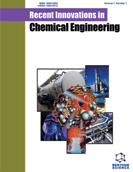Abstract
A solid phase preconcentration procedure is described by using Penicillium digitatum loaded on pumice stone for the determination of Co(II), Fe(III) and Ni(II) in water and vegetables samples by flame atomic absorption spectrometry (FAAS). Experimental variables, including pH, amount of solid-phase, eluent type and flow rate of sample solution were optimized for quantitative recovery of the analytes. The effect of interfering ions on the recoveries was also investigated. Under the optimum conditions, recoveries for Co(II), Fe(III) and Ni(II) were 100±2%, 98±2% and 99±2%, respectively, at 95% confidence level, for spiked water samples. The analytical detection limits were 1.38, 1.88 and 1.56 ng mL-1 for Co(II), Fe(III) and Ni(II), respectively. The accuracy of the method was verified by the analysis of certified reference material (Tea leaves powder, GBW-07605) and spiked samples. The method was successfully applied to the determination of analytes in parsley, carrot, thermal water and tap water samples.
Keywords: Trace metal, Solid phase, Preconcentration, Penicillium digitatum, Pumice stone, Flame atomic absorption spectrometry, Solid-phase Extraction, Nanoparticles, Validation, Complexing Agent















